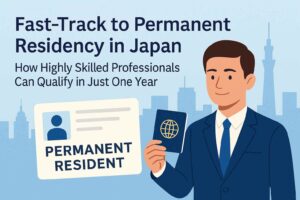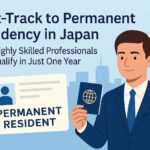
Japan’s Highly Skilled Professional (HSP) visa was introduced in 2012 to attract and retain exceptional foreign talent in research, engineering, and management.
Unlike standard work visas, the HSP visa uses a points-based system—evaluating applicants on education, work experience, income, and language ability.
Those who reach a certain threshold gain powerful immigration advantages, the most remarkable of which is a fast-track to permanent residency.
Normally, foreigners must live in Japan for at least 10 consecutive years before applying for permanent residency.
However, HSP visa holders who score 70 points or more can apply after just 3 years, and those with 80 points or higher after only 1 year of residence.
This system allows skilled professionals to establish a stable life and long-term career in Japan far earlier than under any other visa.
Comparing the Standard and HSP Pathways to Permanent Residency
Under Japan’s general immigration law, permanent residency requires:
- 10+ years of continuous residence, including 5 years on a work or residence visa.
- Good conduct—no criminal record or repeated traffic offenses.
- Stable financial base—sufficient income and no unpaid taxes or social insurance.
For Highly Skilled Professionals, the government offers a significant shortcut:
| HSP Points | Required Period of Stay | Eligibility for PR |
|---|---|---|
| 70 points or more | 3 years | Eligible for PR application |
| 80 points or more | 1 year | Eligible for PR application |
These conditions apply only while the applicant maintains the same level of points during their stay.
This policy reflects Japan’s intent to retain high-caliber talent who contribute to the economy and society.
Permanent residents enjoy extensive benefits: no need to renew visas, freedom to change jobs or start a business, and improved access to loans, education, and housing.
For both individuals and companies, the HSP system accelerates career stability and long-term settlement in Japan.
cf. Immigration Services Agency
Requirements and Key Considerations for Permanent Residency
Although the HSP program eases the time requirement, applicants must still satisfy several essential conditions.
(1) Continuous Residence
Applicants must remain in Japan without interruption as HSP visa holders.
Those with 70 points must have 3 years of residence; those with 80 points, at least 1 year.
Short business trips abroad are acceptable, but long absences or gaps in residence may reset eligibility.
If you change jobs, your new position must remain within the same professional field (e.g., data science → AI engineering).
(2) Stable Income and Financial Independence
A consistent, adequate income is crucial.
Even highly paid professionals may be rejected if their employment contract is unstable or income fluctuates sharply.
Generally, an annual income of 4–5 million yen for singles and 6–7 million yen for families is considered sufficient.
Applicants must also submit proof of tax and social insurance payments for the past three years.
(3) Good Conduct and Legal Compliance
The Immigration Bureau examines not only criminal records but also traffic offenses, unpaid taxes, or missed insurance contributions.
Even minor violations can negatively affect evaluation, as PR status implies full trust in the applicant’s integrity.
(4) Family Members’ Status
If the applicant lives with family, their visa, tax, and insurance records are also reviewed.
Ensuring family members maintain proper residence and financial compliance strengthens the overall application.
Common Mistakes
- Failing to update the points calculation sheet, leading to a score drop below 70.
- Ignoring age-based deductions, which can lower total points.
- Underestimating the impact of job changes or income fluctuations.
- Incomplete tax or insurance documentation.
To prevent these errors, applicants are advised to recalculate their points and check all supporting documents before submission.
A licensed gyoseishoshi (administrative scrivener) can assist with verification and minimize rejection risks.
Real-World Examples: How HSP Holders Gained Permanent Residency
Case 1: 80-Point Engineer (1-Year Track)
Dr. A, an engineer with a Ph.D. and annual income of 10 million yen, scored 80 points.
After one year of continuous residence and steady employment, he submitted his PR application with proof of tax payment, employment, and insurance.
The process took around 8 months for approval.
Case 2: 75-Point Researcher (3-Year Track)
Ms. B, a university researcher with a master’s degree, 7 years of experience, and JLPT N1, scored 75 points.
After 3 years of stable research work and documented results, she was granted PR in about 10 months.
Even with a fixed-term contract, her renewal prospects and research continuity were key.
Case 3: HSP with Family
Mr. C, an IT manager with 80 points, applied for PR together with his spouse and two children.
All family members had valid visas, tax records, and insurance coverage.
Thanks to this consistency, the family received PR approval after 11 months.
Case 4: Job Change and Point Drop
Mr. D changed companies, leading to a temporary income decrease that reduced his score from 80 to 75.
He postponed his application, reestablished 3 years of residence, and was eventually approved.
Lesson: PR eligibility depends on maintaining the required points through the entire qualifying period.
Planning for Long-Term Stability
The HSP visa’s permanent residency pathway is more than an administrative shortcut—it’s a foundation for a secure and independent life in Japan.
Achieving PR status eliminates renewal anxiety, facilitates entrepreneurship, and enhances social credibility.
For families, it ensures educational stability and integration into Japanese society.
However, the PR review remains rigorous.
Applicants must demonstrate both professional excellence and long-term compliance with Japan’s social and legal systems.
To succeed, consider consulting a certified Administrative Scrivener (Gyoseishoshi) to:
- Recalculate your HSP points before application,
- Review tax and insurance records for accuracy,
- Prepare responses for potential immigration inquiries.
Ultimately, the Highly Skilled Professional visa offers not only career advancement but also the opportunity to make Japan your permanent home—so long as you approach the process strategically and responsibly.
✅ Written by a certified Administrative Scrivener specializing in immigration and residence status procedures in Japan.
For consultation or document support, visit: VISAdeAI Japan





